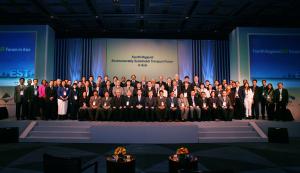 Date: 24-26 February 2009
Date: 24-26 February 2009
Place: Seoul, Republic of Korea
Venue: Grand Hyatt Seoul (747-7 Hannam 2-Dong, Yongsan-Ku, Seoul, Republic of Korea)
The United Nations Centre for Regional Development (UNCRD), the Ministry of Land, Transport, and Maritime Affairs (MLTM) of the Republic of Korea, and the Ministry of the Environment of Japan (MOE-J) co-organized Fourth Regional EST Forum in Seoul, Republic of Korea from 24 to 26 February 2012. At the Forum, high level policy dialogue was made, sharing best practices, policy instruments, tools and technologies in the areas of urban environment. Climate change and co-benefits, and Non-Motorised Transport were the two significant themes highlighted in the plenary sessions. At the end of the Forum, Seoul Statement-Towards the Promotion of Environmentally Sustainable Transport (EST) for a Low-Carbon Society and Green Growth in Asia was adopted by the participating countries.
Organizers and Supporting Organizations
Organizers:
United Nations Centre for Regional Development (UNCRD)
Ministry of Land, Transport, and Maritime Affairs (MLTM) of the Republic of Korea
Ministry of the Environment of the Government of Japan
Supporting Organizations:
World Health Organization (WHO)
German Technical Cooperation (GTZ)
Swedish International Development Agency (Sida)
Global Transport Knowledge Partnership (gTKP)
Japan International Cooperation Agency (JICA)
Asian Development Bank (ADB)
Clean Air Initiative for Asian Cities (CAI-Asia) Center
World Bank
Korea Transport Institute (KOTI)
OBJECTIVES
- To conduct policy dialogue and share best practices, policy instruments, tools and technologies in the areas of urban environment and transport in line with the philosophy of EST
- To follow-up on the implementation of the Aichi Statement, adopted in the First Regional EST Forum held on 1-2 August 2005 in Nagoya, Japan through sharing government initiatives and policies in relation to the ten thematic areas of EST
- To discuss and explore linkages with other on-going national, regional and international activities / initiatives in promoting environmentally sustainable transport
- To focus on how Asian countries can take a more active role in climate change mitigation by adopting a co-benefit approach which integrates urban air quality management, energy efficiency measures, and climate change mitigation through EST measures
- To adopt the Seoul Statement, which highlights the contribution of EST measures in the context of low carbon green growth
MEETING SUMMARY
PARTICIPANTS
A total of approximately 200 participants attended the Fourth Regional EST Forum including:
- National Government representatives from both the Ministry of Environment and Ministry of Transport from 22 Asian countries (Afghanistan, Bangladesh, Bhutan, Brunei Darussalam, Cambodia, P. R. China, India, Indonesia, Japan, Republic of Korea, Lao PDR, Malaysia, Maldives, Mongolia, Myanmar, Nepal, Pakistan, Philippines, Singapore, Sri Lanka, Thailand, and Viet Nam)
- Representatives from the Ministry of Health attended the Second Regional EST Forum with the support of World Health Organization (WHO)
- International Experts selected for different thematic areas of EST
- International organizations and research institutions working in the fields related to EST
PROGRAMME
DISCLAIMER: The designations employed and the presentation of the information in this web site do not imply the expression of any opinion whatsoever on the part of the Secretariat of the United Nations concerning the legal status of any country, territory, city or area or of its authorities, or concerning the delimitation of its frontiers or boundaries.
PRESENTIONS
- Plenary Session 1 (Presentation) Win-Win Solutions to Climate Change and Transport
- Plenary Session 2 (Presentation) Formulation of a National EST Strategy for the Philippines
- Plenary Session 3 (Presentation) Overview of the Partnership for Clean Fuels and Vehicles (PCFV) and the Opportunities for Partnership and Capacity Building in EST Areas
- Plenary Session 3 (Presentation) Sustainable Urban Mobility in Asia (SUMA) Project and EST Linkages
- Plenary Session 4 (Presentation) The Critical Importance of Non-motorized Transport Planning for Modern Asian Cities
- Plenary Session 4 (Presentation) NMT and Urban Design Best Practices and Applications in Asian Cities
- Plenary Session 4 (Presentation) Shared Bicycle Schemes in European Cities
- Plenary Session 4 (Presentation) Social Equity and Gender Benefits of NMT
- Plenary Session 6-1 (Presentation) Overall Strategy and Programmes of the World Bank in Carbon Financing and Climate Change Mitigation Measures in the Transport Sector
- Plenary Session 6-1 (Presentation) ADB's Urban Transport Strategy for Asia towards Climate Change Mitigation
- Plenary Session 6-1 (Presentation) MOE-J's Actions for Putting Co-benefits Forward
- Plenary Session 6-1 (Presentation) Introduction of CDM Methodology for the Transport Sector (Energy Recovery Break System of Delhi Metro in India ) and Further Application
- Plenary Session 6-2 (Presentation) Towards Realizing Low-Carbon and Low-Pollution Transport Systems: Ministerial Conference on Global Environment and Energy in Transport (MEET) and the Next Steps
- Plenary Session 6-2 (Presentation) Proposed Action Plan to Make Transport in Developing Countries More Climate Friendly
- Plenary Session 6-2 (Presentation) Low-Carbon Development and Green Growth in Asia and the Pacific
- Plenary Session 6-2 (Presentation) Recent Public Transport Policies for Green Growth in Korea
- Plenary Session 6-2 (Presentation) Control and Strategy for Reduction of Pollutants from Automobiles for Low-Carbon Green Growth in Korea
Country Initiatives and Policy Dialogue
Breakout Group 1
Breakout Group 2
Breakout Group 3
Breakout Group 4
Breakout Group 5
Breakout Group 6
Report from Breakout Group

